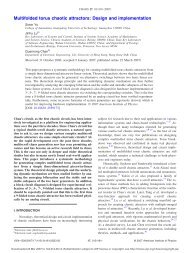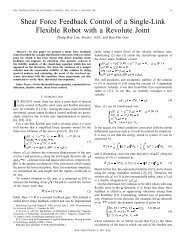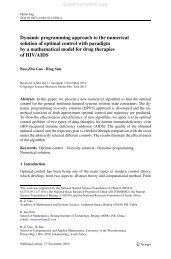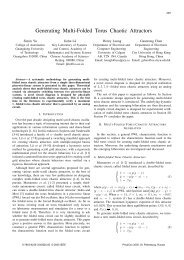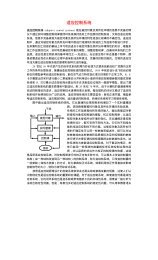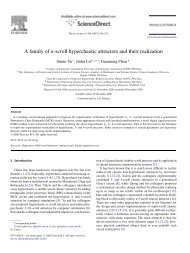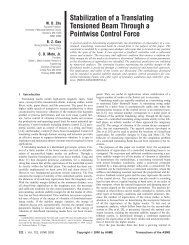Conference Program of WCICA 2012
Conference Program of WCICA 2012
Conference Program of WCICA 2012
Create successful ePaper yourself
Turn your PDF publications into a flip-book with our unique Google optimized e-Paper software.
<strong>Conference</strong> <strong>Program</strong> <strong>WCICA</strong> <strong>2012</strong><br />
on the uncertain couplings.<br />
◮ FrA10-5 14:50–15:10<br />
State Estimation for a Class <strong>of</strong> Nonlinear Systems with Multi-package<br />
Transmission, pp.2221–2226<br />
Wang, Xia<strong>of</strong>eng<br />
He, Xiao<br />
Wang, Zidong<br />
Tsinghua Univ.<br />
Tsinghua Univ.<br />
Tsinghua Univ.<br />
In this paper, the state estimation problem for a class <strong>of</strong> nonlinear systems<br />
with multiple channels and correlated noises is studied in the<br />
framework <strong>of</strong> Extended Kalman Filter (EKF). In networked systems,<br />
when sensors are distributed in a large spatial area and multiple channels<br />
are employed to transfer data from different sensors, measurements<br />
may be lost at different rates. A diagonal matrix is utilized to<br />
describe this phenomenon and an unbiased optimal nonlinear filter is<br />
constructed in the least mean square sense. An illustrative example is<br />
provided and the comparison <strong>of</strong> the results between our method and<br />
the EKF shows the effectiveness <strong>of</strong> the proposed approach.<br />
◮ FrA10-6 15:10–15:30<br />
Kalman Filtering with Scheduled Measurements - Part I: Estimation<br />
Framework, pp.2251–2256<br />
You, Keyou<br />
Xie, Lihua<br />
Nanyang Technological Univ.<br />
Nanyang Technological Univ.<br />
This paper proposes an estimation framework under scheduled measurements<br />
for linear discrete-time stochastic systems. Both controllable<br />
and uncontrollable schedulers are considered. Under a controllable<br />
scheduler, only the normalized measurement innovation greater than a<br />
threshold will be communicated to the estimator. While under an uncontrollable<br />
scheduler, the time duration between consecutive sensor communications<br />
is triggered by an independent and identically distributed<br />
process. For both types <strong>of</strong> scheduler, recursive estimators that achieve<br />
the minimum mean square estimation error are derived, respectively.<br />
Moreover, necessary and sufficient conditions for stability <strong>of</strong> the mean<br />
square estimation error are provided.<br />
FrA11 13:30–15:30 Room 311C<br />
Invited Session: Intelligent Optimization and Evolutionary Computation<br />
(I)<br />
Chair: Chen, Jie<br />
Co-Chair: Wang, Ling<br />
Beijing Inst. <strong>of</strong> Tech.<br />
Tsinghua Univ.<br />
◮ FrA11-1 13:30–13:50<br />
Online Route Planning for UAV Based on Model Predictive Control and<br />
Particle Swarm Optimization Algorithm, pp.397–401<br />
Peng, Zhihong<br />
Li, Bo<br />
Chen, Xiaotian<br />
Wu, Jin Ping<br />
Beijing Inst. <strong>of</strong> Tech.<br />
Beijing Inst. <strong>of</strong> Tech.<br />
Sci. & Tech. on Complex Land Sys. Simulation<br />
Laboratory<br />
Beijing Inst. <strong>of</strong> Tech.<br />
Based on the model predictive control (MPC) and particle swarm optimization<br />
(PSO) algorithm, an online three-dimension route planning<br />
algorithm is proposed in this paper for UAV under the partially known<br />
task environment with appearing threats. By using the preplanningonline<br />
route tracking pattern, a reference route is planned in advance<br />
according to the known environment information. During the flight, the<br />
UAV tracks the reference route and detects the information <strong>of</strong> the environment<br />
and threats. Based on the MPC and PSO algorithm, the online<br />
route planning can be achieved by means <strong>of</strong> route prediction and receding<br />
horizon optimization. In such a case, UAV can avoid the known and<br />
appearing threats successfully. Compared to the traditional online route<br />
planning algorithm, the proposed method, by making use <strong>of</strong> the partially<br />
known information, can reduce the complexity, and meanwhile improve<br />
the real-time and the feasibility <strong>of</strong> the planning route. Simulation results<br />
demonstrate the effectiveness <strong>of</strong> the proposed algorithm.<br />
◮ FrA11-2 13:50–14:10<br />
Surrogate Models for User’s Evaluations base on Weighted Support<br />
Vector Machine in IGAs, pp.144–149<br />
Yang, Lei<br />
China Univ. <strong>of</strong> Mining & Tech.<br />
Gong, Dunwei<br />
Sun, Xiaoyan<br />
Sun, Jing<br />
China Univ. <strong>of</strong> Mining & Tech.<br />
China Univ. <strong>of</strong> Mining & Tech.<br />
China Univ. <strong>of</strong> Mining & Tech.<br />
Interactive genetic algorithms (IGAs) are effective methods <strong>of</strong> tackling<br />
optimization problems involving qualitative indices by incorporating a<br />
user’s evaluations into traditional genetic algorithms. The problem<br />
<strong>of</strong> user fatigue resulting from the user’s evaluations, however, has a<br />
negative influence on the performance <strong>of</strong> these algorithms. Substituting<br />
the user’s evaluations with various surrogate models is beneficial<br />
to alleviate user fatigue. Previous studies, however, have not taken full<br />
advantage <strong>of</strong> information provided by samples obtained earlier when<br />
constructing or updating these models. We focus on the issue <strong>of</strong> user<br />
fatigue in this study, and present a novel method <strong>of</strong> effectively alleviating<br />
user fatigue by substituting the user’s evaluations with a weighted<br />
support vector machine (WSVM) and by incorporating it with the mechanism<br />
<strong>of</strong> transfer learning. The proposed method is applied to the fashion<br />
evolutionary design system and compared with previous effective<br />
IGAs. The experimental results confirm the advantage <strong>of</strong> the proposed<br />
method in both alleviating user fatigue and improving the precision <strong>of</strong><br />
the surrogate model.<br />
◮ FrA11-3 14:10–14:30<br />
A Hybrid Algorithm Based on Simplex Search and Differential Evolution<br />
for Hybrid Flow-shop Scheduling , pp.643–648<br />
Xu, Ye<br />
Wang, Ling<br />
Wang, Shengyao<br />
Tsinghua Univ.<br />
Tsinghua Univ.<br />
Tsinghua Univ.<br />
An effective hybrid algorithm by merging the searching mechanisms<br />
<strong>of</strong> Nelder-Mead (NM) simplex method and differential evolution (DE) is<br />
proposed to solve the hybrid flow-shop problem (HFSP) in this paper.<br />
By using a special encoding, the NM and DE methods can be used<br />
to solve permutation based combinatorial optimization problems. By<br />
combining the DE based global search and NM method based local<br />
search, the exploration and exploitation abilities are enhanced and well<br />
balanced for solving the HFSP. Numerical testing results and comparisons<br />
show that the proposed algorithm is effective, efficient and robust<br />
in solving the HFSP.<br />
◮ FrA11-4 14:30–14:50<br />
A Compact Estimation <strong>of</strong> Distribution Algorithm for Solving Hybrid Flowshop<br />
Scheduling Problem, pp.649–653<br />
Wang, Shengyao<br />
Wang, Ling<br />
Xu, Ye<br />
Tsinghua Univ.<br />
Tsinghua Univ.<br />
Tsinghua Univ.<br />
According to the characteristics <strong>of</strong> the hybrid flow-shop scheduling<br />
problem (HFSP), the permutation based encoding and decoding<br />
schemes are designed and a probability model for describing the distribution<br />
<strong>of</strong> the solution space is built to propose a compact estimation <strong>of</strong><br />
distribution algorithm (cEDA) in this paper. The algorithm uses only t-<br />
wo individuals by sampling based on the probability model and updates<br />
the parameters <strong>of</strong> the probability model with the selected individual.<br />
The cEDA is efficient and easy to implement due to its low complexity<br />
and comparatively few parameters. Simulation results based on some<br />
widely-used instances and comparisons with some existing algorithms<br />
demonstrate the effectiveness and efficiency <strong>of</strong> the proposed compact<br />
estimation <strong>of</strong> distribution algorithm. The influence <strong>of</strong> the key parameter<br />
on the performance is investigated as well.<br />
◮ FrA11-5 14:50–15:10<br />
A Memetic PSO based KNN Regression Method for Cycle Time Prediction<br />
in a Wafer Fab, pp.474–478<br />
Ni, Jiacheng<br />
Tongji univ<br />
In this paper, cycle time prediction <strong>of</strong> wafer lots is studied. A memetic<br />
algorithm called GSMPSO by combining the PSO with a Gaussian<br />
mutation operator and a Simulated Annealing (SA)-based local search<br />
operator is developed to weight the features for K Nearest Neighbors<br />
(KNN) regression. The GSMPSO-KNN regression method is adopted<br />
to predict the cycle time <strong>of</strong> wafer lots. The experiment result demon-<br />
100



